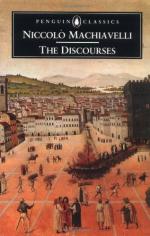
|
| Name: _________________________ | Period: ___________________ |
This quiz consists of 5 multiple choice and 5 short answer questions through Book Two, The Growth of Rome's Empire, Preface, Methods of Expansion, Colonization and War: Its Causes and Cost, Diplomacy and War.
Multiple Choice Questions
1. What is the branch of government that Machiavelli recognizes as that which most prevents or causes corruption to come over a city?
(a) The legislative branch.
(b) The plebeian branch.
(c) The princes.
(d) The judicial (magistrates) branch.
2. According to Machiavelli, what is the first thing that Citizens seek when starting on the path of chasing their ambitions?
(a) Not to be harmed by citizens or magistrates.
(b) A cause that will incite the passions of the general masses.
(c) The support of a wealthy Noble.
(d) Means to win access to public office.
3. To what does Machiavelli compare great kingdoms and republics from history?
(a) To his projections of the future in which Machiavelli speculated on how power would be preserved.
(b) To great works of antique art that have been found and preserved.
(c) To the state of political instability in which was common to Machiavelli's day.
(d) To his ideal state that combined the most successful institutions from those civilizations.
4. What was an example from Roman history that Machiavelli used to suggest the Plebes possesses greater wisdom than Nobles?
(a) A time when the Plebes could have chosen all Plebes for four Tribunes, chose, instead, four Nobles because they recognized the weaknesses of Plebes filling those offices.
(b) The Magistrates decision to delay battle against the Samnites.
(c) The failed attempt of the Nobles to put Plebes of ill-repute to selection for Tribunes.
(d) The willingness of the Plebes to go to war for the glory of Rome.
5. What does Machiavelli believe inspired the expansion of the Roman Empire?
(a) Harsh Captains guiding the military.
(b) Aggression and murder.
(c) Keeping Citizens in poverty.
(d) Virtue.
Short Answer Questions
1. According to Machiavelli, what type of people seek what office to cause a city to become corrupt?
2. What did Machiavelli cite as the method that Rome used to maintain its freedom?
3. What does Machiavelli believe to the nature of men that causes them to either fight from ambition or from necessity?
4. What does Machiavelli establish as the relationship between gold and good soldiers?
5. How did Machiavelli begin the preface to "The Discourses"?
|
This section contains 543 words (approx. 2 pages at 300 words per page) |

|




